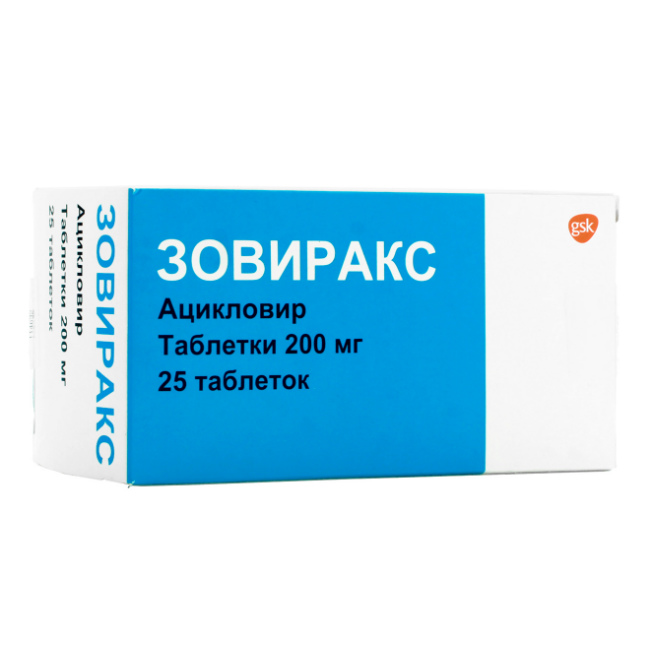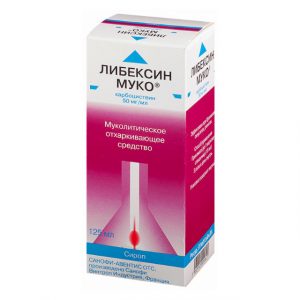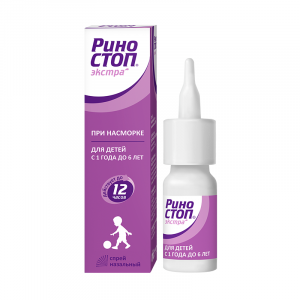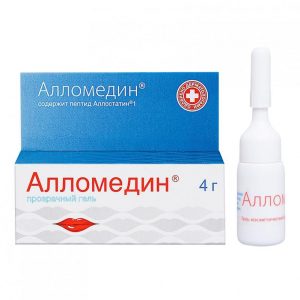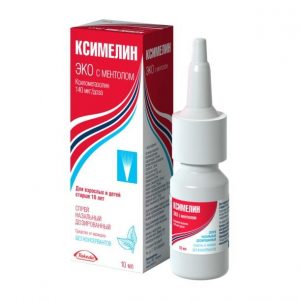Description
The Latin name
ZOVIRAX
Release form
200 mg tablets.
5 tablets per blister of PVC / HSDH / A1 5 blisters in a cardboard box along with instructions for use.
Packaging
25 pcs
Indications
Treatment of infections of the skin and mucous membranes caused by herpes simplex virus, including primary and recurrent genital herpes
Prevention of relapse of infections caused by herpes simplex in patients with normal immune status of the herpes simplex virus infection, prevention of herpes simplex virus, infection in patients with
immunodeficiency Treatment of chickenpox and herpes zoster
Treatment of patients with severe immunodeficiency, mainly with late stages of HIV infection (CD4 + cell count less than 200 / mm in patients with AIDS or severe manifestations of the AIDS-associated complex) and patients after bone marrow transplantation. Studies have shown that combination therapy with Zovirax and antiretroviral drugs (mainly zidovudine inside) significantly reduces mortality in patients with advanced AIDS and patients undergoing bone marrow transplantation.
Contraindications
Zovirax is contraindicated in case of hypersensitivity to acyclovir or valacyclovir.
Zovirax should be used with caution in dehydration and renal failure.
Zovirax in tablet dosage form is not used in children under the age of 3 years.
Use during pregnancy and lactation
Pregnancy
Analysis of the treatment of women with acyclovir during pregnancy did not reveal an increase. the number of birth defects in their children compared to the general population. However, caution should be exercised when prescribing Zovirax to women during pregnancy and assessing the expected benefits for the mother and the possible risk to the fetus.
Lactation
After taking the drug Zovirax inside at a dose of 200 mg 5 times a day, acyclovir was determined in breast milk at a concentration of 60 to 410% of the plasma concentration. At such concentrations in breast milk, breast-fed infants can receive acyclovir at a dose of up to 0.3 mg / kg / day. Considering this, caution should be exercised when prescribing Zovirax to lactating women.
Ingredients
Active ingredient:
acyclovir 200.0 mg
Other components:
lactose monohydrate,
microcrystalline cellulose, srdlkrc carboxymet
magnesium stearate.
Dosage and administration of
tablets Zovirax can be taken with food, since eating does not significantly affect its absorption. Tablets should be washed down with a full glass of water.
Adults
Treatment of herpes simplex virus infections
For the treatment of herpes simplex virus infections, the recommended dose of Zovirax is 200 mg 5 times a day every 4 hours, except for the period of night sleep. Usually the course of treatment is 5 days, but can be extended for severe primary infections.
In case of severe immunodeficiency (for example, after bone marrow transplantation) or in case of malabsorption from the intestine, the dose of Zovirax for oral administration can be increased to 400 mg 5 times a day.
Treatment should be started as soon as possible after infection occurs in relapses, it is recommended to prescribe the drug already in the prodromal period or when the first elements of the rash appear.
Prevention of relapse of infections caused by herpes simplex virus
For the prevention of relapse of infections caused by herpes simplex virus in patients with normal immune status, the recommended dose of Zovirax is 200 mg 4 times a day (every 6 hours).
For many patients, a more convenient treatment regimen 400 mg 2 times a day (every 12 hours) is suitable.
In some cases, lower doses of Zovirax 200 mg 3 times a day (every 8 hours) or 2 times a day (every 12 hours) are effective. In some patients, interruption of infection may occur when taking a total daily dose of 800 mg.
Treatment with Zovirax should be interrupted periodically for 6-12 months to identify possible changes in the course of the disease.
Prevention of herpes simplex virus infections in immunocompromised patients: For the prevention of herpes simplex virus infections in immunocompromised patients, the recommended dose of Zovirax is 200 mg 4 times a day (every 6 hours).
In case of severe immunodeficiency (e.g. after bone marrow transplantation) or in case of malabsorption from the intestine, the dose of Zovirax for oral administration can be increased to 400 mg 5 times a day. The duration of the preventive course of therapy is determined by the length of the period when there is a risk of infection.
Treatment of chickenpox and herpes zoster: For the treatment of chickenpox and herpes zoster, the recommended dose of Zovirax is 800 mg 5 times a day, the drug is taken every 4 hours, except for the period of night sleep. The course of treatment is 7 days. The drug should be prescribed as soon as possible after the onset of infection, since in this case the treatment is more effective.
Treatment of patients with severe immunodeficiency: For the treatment of patients with severe immunodeficiency, the recommended dose of Zovirax is 800 mg 4 times a day (every 6 hours).
Patients undergoing bone marrow transplantation, before the appointment of Zovirax for oral administration, it is usually recommended to take a course of intravenous therapy with Zovirax for 1 month.
In clinical trials, the maximum duration of a course of treatment for bone marrow transplant recipients was 6 months (from the 1st to the 7th month after transplantation). In patients with a developed clinical picture of HIV infection, the course of treatment with Zovirax was 12 months, but there is reason to believe that longer courses of therapy can be effective in such patients.
Children 3 years of age and older
Treatment and prevention of infections, caused by the herpes simplex virus, in children with immunodeficiency and normal immune status: from 3 years and older – the same doses as for adults
Treatment of chickenpox
older than 6 years – 800 mg 4 times a day
from 3 to 6 years – 400 mg 4 times a day
More precisely, the dose can be determined from the calculation of 20 mg / kg body weight (but not more than 800 mg) 4 times a day. The course of treatment is 5 days.
There are no data on the prevention of relapse of infections caused by the herpes simplex virus and the treatment of herpes zoster in children with normal immunity.
Treatment of pediatric patients with severe immunodeficiency
According to very limited information, the same doses of Zovirax can be used to treat children older than 3 years with severe immunodeficiency. as for the treatment of adults with immunodeficiency (i.e. 800 mg 4 times a day every 6 hours).
Elderly patients
In old age, there is a decrease in the clearance of acyclovir in the body along with a decrease in creatinine clearance.
Elderly patients should receive a sufficient amount of fluid while taking high doses of Zovirax, and in case of renal failure, they need to decide whether to reduce the dose of Zovirax.
Patients with Renal Insufficiency
Caution should be exercised when prescribing Zovirax to patients with renal insufficiency.
In patients with renal insufficiency, taking acyclovir orally in recommended doses for the treatment and prevention of herpes simplex virus infections does not lead to cumulation of the drug to concentrations exceeding established safe levels. However, in patients with severe renal failure (creatinine clearance less than 10 ml / min), the dose of Zovirax is recommended to be reduced to 200 mg 2 times a day (every 12 hours).
In the treatment of chickenpox, herpes zoster, and also in the treatment of patients with severe immunodeficiency, the recommended doses of Zovirax are:
severe renal failure (creatinine clearance less than 10 ml / min) 800 mg 2 times a day every 12 hours
moderate renal failure ( creatinine clearance 10-25 ml / min) 800 mg 3 times a day every 8 hours.
Side effects of the digestive system: nausea, vomiting, diarrhea, abdominal pain rarely – a reversible increase in bilirubin levels and activity of liver enzymes.
From the hemopoietic system: very rarely – anemia, leukopenia, thrombocytopenia.
From the urinary system: rarely – increased levels of urea and creatinine in the blood very rarely – acute renal failure.
From the side of the central nervous system: headache rarely – reversible neurological disorders, such as dizziness, confusion, hallucinations, drowsiness, convulsions, coma. Typically, these side effects were observed in patients with renal failure who took the drug in doses exceeding the recommended ones.
Allergic reactions: rash, photosensitivity, urticaria, itching rarely – shortness of breath, angioedema, anaphylaxis.
Other: rapid fatigue rarely – rapid diffuse hair loss. Since this type of alopecia is observed in various diseases and in the treatment of many drugs, its relationship with the use of acyclovir has not been established.
In patients receiving antiretroviral drugs, the additional intake of Zovirax did not cause a significant increase in toxic effects.
Drug Interaction
No clinically relevant interaction of Tevetin with other drugs was observed.
Digoxin, warfarin, glibenclamide – when co-administered with Teveten had no effect on the pharmacokinetics of digoxin and the pharmacodynamics of warfarin, glibenclamide.
Ranitidine, ketoconazole,
The combined use of acyclovir and mycophenolate mofenil, an immunosuppressant used in organ transplantation, results in an increase in the AUC of acyclovir and the inactive metabolite of mycophenolate mofenil.
Overdose
Symptoms of
Acyclovir is only partially absorbed in the gastrointestinal tract. At accidental single doses of acyclovir orally in doses up to 20 g, no toxic effects have been reported. Repeated doses in excess of the recommended, within several days, there were disorders of the gastrointestinal tract (nausea, vomiting) and neurological (headache and confusion).
Sometimes there may be shortness of breath, diarrhea, impaired renal function, agitation, confusion, hallucinations, seizures, coma.
Treatment
Patients need close medical monitoring to identify possible symptoms of intoxication. Acyclovir is excreted by hemodialysis, therefore, hemodialysis can be used to develop symptoms of intoxication.
Storage conditions
Store in a dry place, at a temperature below 25 ° C.
Keep out of the reach of children.
Expiration
5 years.
Deystvuyuschee substances
acyclovir
dosage form
dosage form
tablets
GlaxoSmithKline, Spain / Poland
